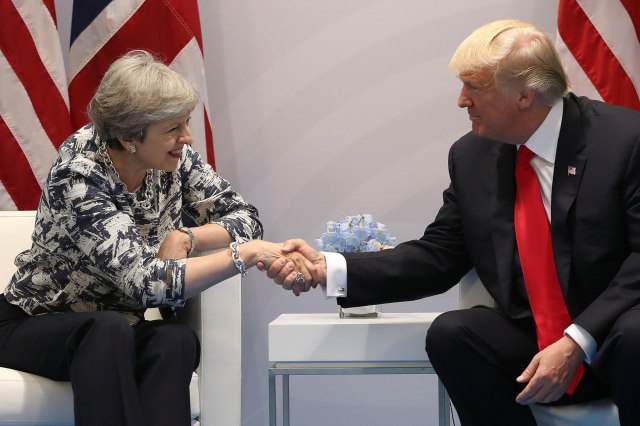Credit:Matt Cardy/Getty Images

Brexit has paralysed the British government, but over on this side of the pond the paroxysms of our closest ally have barely been noticed. Some of that is due to our own dysfunction, reflected in the ongoing and seemingly never-ending government shutdown. But more deeply, it reflects just how narrowly Americans view ‘the special relationship’.
Over here Britain is viewed largely in one of two ways, either through a cultural lens, or through a security one. Brexit doesn’t attract our attention much because, frankly, how it turns out doesn’t really affect these.
Britain’s cultural attraction is based largely on her history and her array of entertainment personalities. Nothing about Brexit is going to dim American enthusiasm to visit London or the English countryside. Nothing about Brexit will disturb news about Harry and Meghan or the monarchy. And nothing about Brexit is going to interrupt the steady stream of high-class television shows and media personalities that endlessly find favour here.
The only real concern I hear from my fellow Americans is Brexit’s potential impact on the Premier League. English football, or soccer as it’s known here, has attracted a small but growing following, especially among the educated young. The thought that Chelsea, for example, might actually have to use English players, rather than buy the world’s best, is causing great distress among fans of the Blues. But that doesn’t lead them to understand the Brexit debate; it simply leads them to oppose it without a second thought.
If there was serious concern, it would focus on our ongoing security, military, and diplomatic relationships, but, again, there is little to fear from the Brexit debate no matter how it unfolds. Our intelligence agencies will cooperate whether the UK is in the EU or not. Britain and the US will likely still share common diplomatic interests regardless of Brexit, and the arenas of disagreement have little do with EU politics.
Brexit, then, does not seriously affect the aspects in which American policymakers view the relationship as special. There is genuine concern that Brexit could propel Jeremy Corbyn to number 10, but American policymakers are separating that possibility from the actual Brexit negotiations. They will weigh in and demonstrate concern if it appears that Corbyn might win an imminent general election. Until then, not much will attract continued interest or attention here.
There is, of course, an overwhelmingly anti-Brexit sentiment among the policy and intellectual elites who do occupy themselves with following British affairs. Americans in Washington, New York, and our leading universities are little different in this regard from their British counterparts in Westminster, the City, and Oxbridge. To the extent they are following the Brexit debates, they do so from the hope that the Prime Minister and her party will eventually ‘come to their senses’ and ‘do the right thing’.
They have the same attitude towards President Trump, and in both cases dramatically downplay the social divisions that humiliating large segments of the population who support Trump or Brexit would create. But that attitude of sneering, dripping condescension towards nearly half of the citizens in these countries seems par for the course among political, business, and academic elites virtually everywhere in the West today. This causes them to view the Brexit debate through very tinted glasses, preventing them from understanding how wrenching this actually is for the British people.
The man in the White House surely takes a different view, but he is still seeing Brexit through a set of tinted glasses, those of his own self-regard. For him, Brexit is a forerunner of his own unexpected victory, coming as it did from similar types of people. He thus retains some romantic attachment to the idea of Brexit, but he rarely gives Europe or Britain any serious consideration. He would be happy to sign a trade deal with the United Kingdom should he be able to, but is unlikely to weigh in further, or show partiality, during the ongoing debate.
He will particularly have in mind President Obama’s incautious remarks on the eve of the referendum saying that voting Leave would put the UK “at the back of the queue” for trade talks. If there’s anything predictable about this Administration, it is that it will do the opposite of its predecessor at every conceivable opportunity.
So there you have it. The mother of Parliaments is in disarray, the home of Magna Carta is in uncharted territory, and your greatest offspring can barely be bothered to phone home and ask how you’re doing. But don’t take that as a sign of serious lack of respect or interest. Rather, take it for what it is: confidence from a fully independent and self-occupied child that Britain will muddle through. We’re secure in the knowledge that we’ll share happy and productive time together once the current unpleasantness passes.










Join the discussion
Join like minded readers that support our journalism by becoming a paid subscriber
To join the discussion in the comments, become a paid subscriber.
Join like minded readers that support our journalism, read unlimited articles and enjoy other subscriber-only benefits.
Subscribe